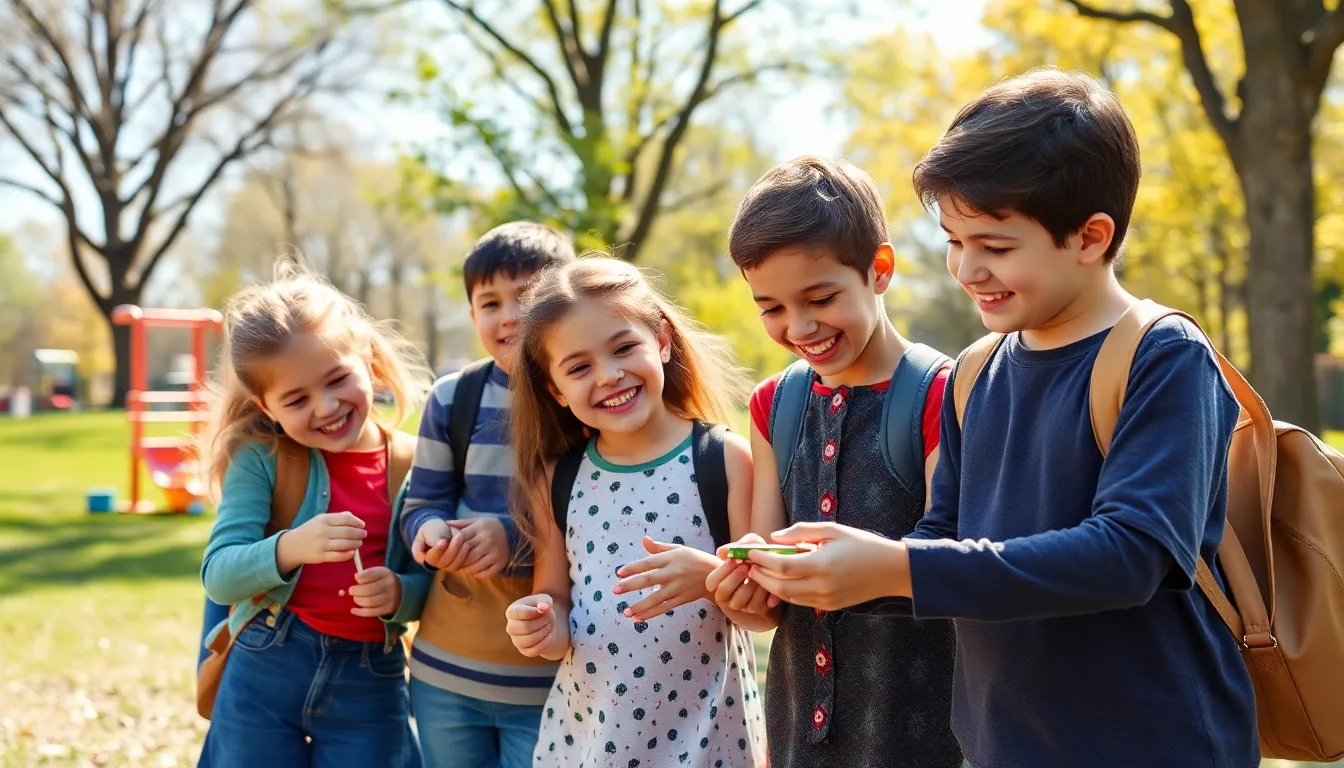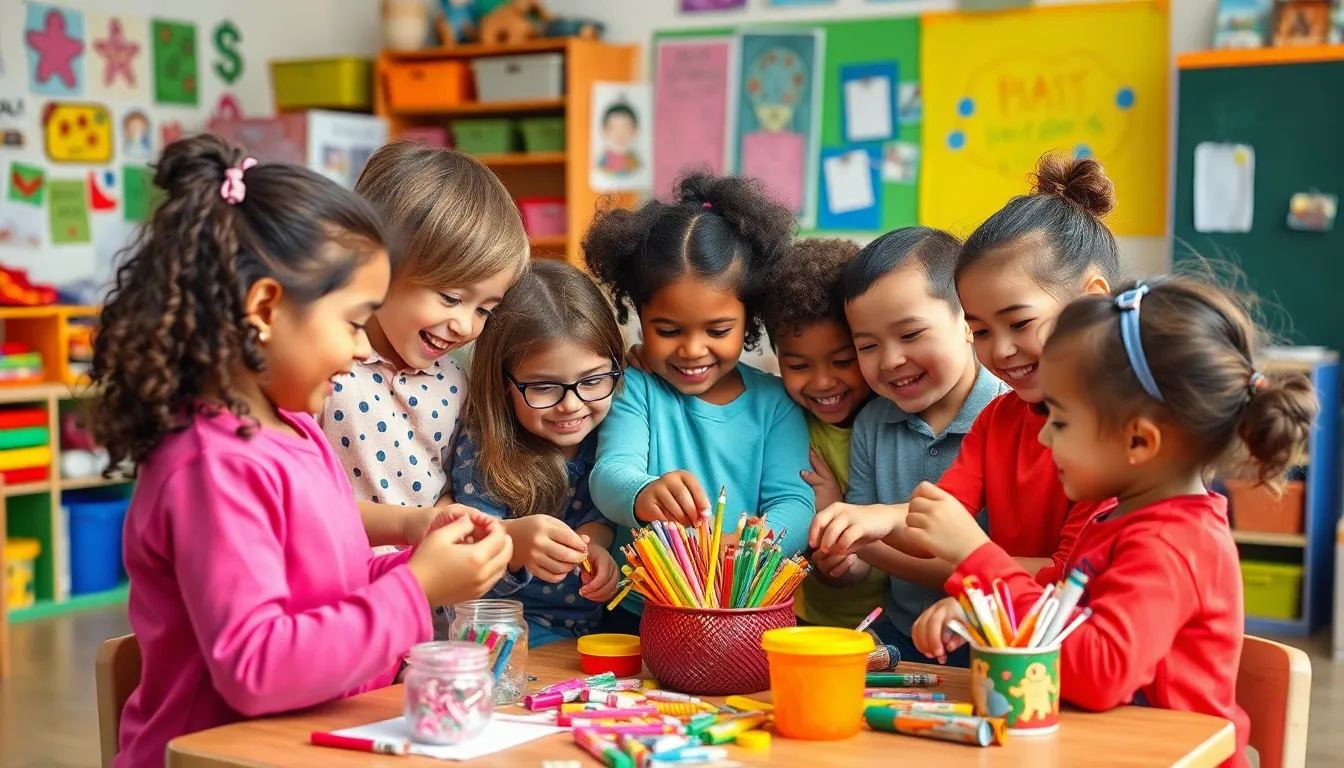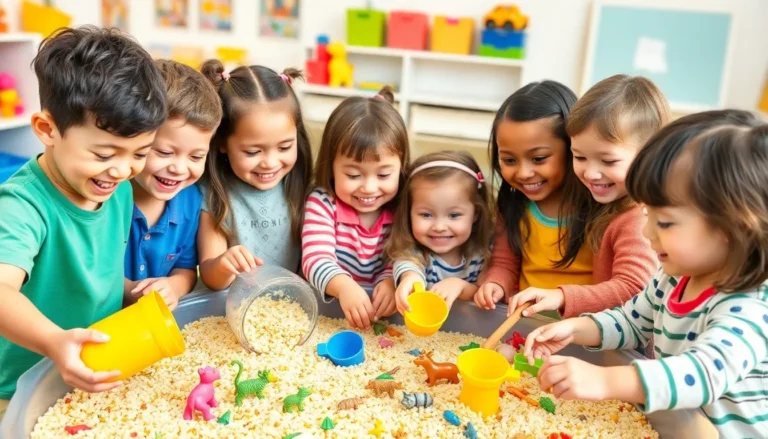Table of Contents
ToggleIn a world that thrives on connection and collaboration, teaching children the values of sharing and cooperation is more important than ever. These foundational skills not only foster positive relationships but also lay the groundwork for effective teamwork in the future. By instilling these values early on, parents and educators can help children navigate social interactions with empathy and understanding.
Sharing and cooperation go beyond simply playing well with others; they encourage problem-solving and critical thinking. When children learn to work together, they develop essential life skills that will serve them in school and beyond. This article explores practical strategies and engaging activities that promote these vital qualities, ensuring that the next generation is equipped to build a more harmonious and collaborative society.
Importance Of Teaching Sharing And Cooperation
Teaching sharing and cooperation creates a foundation for positive relationships and teamwork skills. These qualities prepare children for personal and societal success.
Benefits For Children
- Emotional Development: Sharing and cooperation nurture empathy, helping children understand others’ feelings and needs.
- Social Skills: Children learn essential interaction methods through cooperative activities, enhancing their ability to connect with peers.
- Conflict Resolution: Engaging in shared tasks teaches children to negotiate and resolve conflicts effectively.
- Cognitive Growth: Collaborative problem-solving encourages critical thinking and creativity, promoting intellectual development.
- Self-Esteem: Successfully sharing and cooperating boosts children’s confidence and self-worth through positive reinforcement from peers.
Benefits For Society
- Community Building: Cooperative behavior fosters stronger community ties, encouraging a sense of belonging among members.
- Reduced Conflict: Societies that prioritize sharing experience lower levels of conflict and hostility, leading to safer environments.
- Increased Collaboration: Shared values enhance collective efforts, enabling communities to tackle challenges cohesively.
- Resource Management: Teaching sharing promotes sustainable practices, encouraging efficient use of resources within communities.
- Future Leaders: Children who learn these values become responsible adults and innovators, contributing positively to society.
Strategies For Teaching Sharing

Implementing effective strategies can significantly enhance children’s understanding of sharing. Engaging methods foster an environment where children learn valuable skills through practical experiences.
Interactive Activities
Interactive activities motivate children to practice sharing and cooperation. Incorporate the following activities to promote these values:
- Group Games: Conduct team-based games that require players to work together, such as relay races or scavenger hunts, emphasizing collaborative efforts.
- Resource Sharing: Provide limited resources for group projects, prompting children to discuss and divide tasks responsibly.
- Arts and Crafts: Facilitate a shared art project, where children must combine their creativity and resources to achieve a collective goal.
- Role-Playing: Create scenarios that encourage children to role-play sharing situations, offering opportunities to practice and reflect on their interactions.
Storytelling Techniques
- Narratives with Moral Lessons: Select stories where characters experience the positive outcomes of sharing, reinforcing the concept in a relatable manner.
- Interactive Storytelling: Invite children to participate in storytelling by suggesting alternate endings that involve cooperation and sharing, enhancing engagement.
- Discussion Questions: After a story, ask reflective questions about sharing, helping children connect the narrative to their experiences.
- Character Role Models: Highlight characters that exemplify sharing and cooperation, encouraging children to emulate these behaviors in real life.
Encouraging Cooperation Among Peers
Fostering cooperation among peers enhances children’s social skills and teamwork abilities. Engaging children in collaborative activities cultivates a sense of belonging and responsibility within a group.
Group Projects
Incorporating group projects into learning experiences encourages children to work together toward a common goal. Group projects can take various forms, such as science experiments, art presentations, or community service initiatives. These tasks require delegation of responsibilities, promoting accountability among team members. When children communicate and share ideas, they develop negotiation skills and learn to respect diverse perspectives. Research indicates that students involved in collaborative learning demonstrate improved academic performance and stronger interpersonal relationships (Johnson & Johnson, 2014).
Team-Building Exercises
Implementing team-building exercises boosts collaboration and strengthens peer relationships. Activities like trust falls, relay races, and problem-solving games require effective communication and mutual support. These exercises create an environment where children practice sharing resources and strategizing together. By overcoming challenges as a team, children experience a sense of achievement that reinforces their cooperation skills. According to a study by the Association for Supervision and Curriculum Development, team-building activities lead to lower conflict levels and enhanced camaraderie among participants (ASCD, 2015).
Role Of Parents And Educators
Parents and educators play a crucial role in teaching children the values of sharing and cooperation. They foster environments that support collaborative interactions, shaping children into empathetic and socially adept individuals.
Creating Supportive Environments
Creating supportive environments is essential for effective learning. Parents and educators can establish spaces that encourage teamwork, communication, and problem-solving. Organizing cooperative activities, such as group projects and peer discussions, cultivates trust and respect among children. Providing consistent opportunities for shared experiences, like collaborative games or community service, nurtures social skills and emotional intelligence. By ensuring that children feel safe and valued, they are more likely to engage openly with others, further enhancing their ability to share and cooperate.
Setting Examples Through Behavior
Setting examples through behavior is vital in teaching sharing and cooperation. Parents and educators should model these values in their own interactions. Demonstrating kindness, patience, and collaboration in daily activities reinforces the importance of these traits. When children observe adults engaging in respectful conversations and working together, they are more likely to emulate those behaviors. Consistently acknowledging and praising cooperative efforts encourages children to continue practicing sharing and working together, reinforcing the concepts through real-life applications.
Teaching sharing and cooperation lays the groundwork for a more compassionate and collaborative future. These essential skills not only enhance children’s emotional and social development but also prepare them for the complexities of adult interactions. As they learn to work together and appreciate diverse perspectives, they become more effective problem solvers and empathetic individuals.
The positive impact of these values extends beyond personal growth. By fostering a culture of collaboration in communities, society can tackle challenges more efficiently. Encouraging sharing and cooperation in daily activities cultivates a generation of responsible leaders who prioritize harmony and teamwork. Investing in these lessons today ensures a brighter and more united tomorrow.






